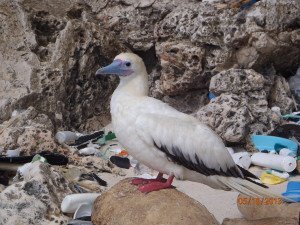The majority of seabird species are accidentally eating bits of plastic and the situation is likely to get worse, predicts a new study.

Based on analysis of published studies since the early 1960s, research undertaken by CSIRO and Imperial College London has found that plastic is increasingly common in seabird’s stomachs. In 1960, plastic was found in the stomach of less than 5% of seabirds, rising to 80% by 2010. The researchers predict that plastic ingestion will affect 99% of the world’s seabird species by 2050, based on current trends.
The scientists estimate that 90% of all sea birds alive today have eaten plastic of some kind. This includes bags, bottle caps, and plastic fibres from synthetic clothes, which have washed out into the ocean from urban rivers, sewers and waste deposits. Birds mistake the brightly coloured items for food, or swallow them by accident, and this causes gut impaction, weight loss and sometimes even death.
The study, published this week in the journal PNAS, noted that the worst affected area was the Southern Ocean boundary in the Tasman Sea between Australia and New Zealand, due to its abundance of seabirds.
“For the first time, we have a global prediction of how wide-reaching plastic impacts may be on marine species – and the results are striking,” says study author Dr Wilcox, a senior research scientist at CSIRO Oceans and Atmosphere.
“This is a huge amount and really points to the ubiquity of plastic pollution.”
The research has made headlines here in New Zealand. Examples include:
MSN NZ News: Almost all seabirds have ingested plastic
3 News: Most seabirds now eating plastic study
New Zealand Herald: Plastic takes deadly toll
Our Changing World: Junk Food: plastic pollution is a growing threat to seabirds
Radio New Zealand: Plastic pollution a growing threat to seabirds
Nine to Noon: Finding a solution to plastic pollution